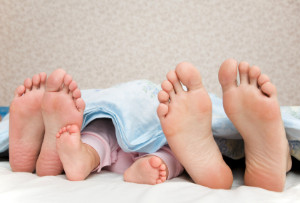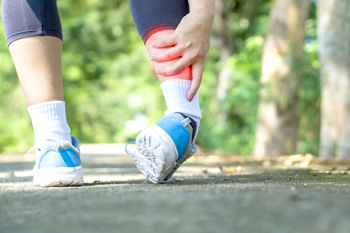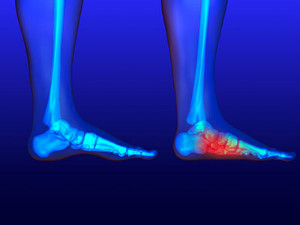Items filtered by date: June 2021
Are You Suffering From Ingrown Toenails?
Contagious Hand, Foot and Mouth Disease
 Excessive blisters on the feet can indicate a condition that is known as hand, foot and mouth disease. It is considered to be a viral infection, and generally affects children ten years and younger. Hand, foot, and mouth disease is a contagious medical condition, and can be passed to other people by coughing, sneezing, or from the fluid that is inside the blisters. Some of the symptoms that are associated with hand, foot and mouth disease can consist of small blisters on the bottom of the feet, and the child can be feverish and tired. Many children can develop a rash, which is generally not itchy. It is beneficial to drink plenty of water daily as this may help to accelerate the healing process. If you notice your child has signs of this condition, it is suggested that you schedule an appointment with a podiatrist who can properly diagnose and offer correct treatment techniques.
Excessive blisters on the feet can indicate a condition that is known as hand, foot and mouth disease. It is considered to be a viral infection, and generally affects children ten years and younger. Hand, foot, and mouth disease is a contagious medical condition, and can be passed to other people by coughing, sneezing, or from the fluid that is inside the blisters. Some of the symptoms that are associated with hand, foot and mouth disease can consist of small blisters on the bottom of the feet, and the child can be feverish and tired. Many children can develop a rash, which is generally not itchy. It is beneficial to drink plenty of water daily as this may help to accelerate the healing process. If you notice your child has signs of this condition, it is suggested that you schedule an appointment with a podiatrist who can properly diagnose and offer correct treatment techniques.
The health of a child’s feet is vital to their overall well-being. If you have any questions regarding foot health, contact Gary J. Kaiserman, DPM of Achilles Footcare Center. Our doctor can provide the care you need to keep you pain-free and on your feet.
Tips for Keeping Children's Feet Healthy
- Make sure their shoes fit properly
- Look for any signs of in-toeing or out-toeing
- Check to see if they have Clubfoot (condition that affects your child’s foot and ankle, twisting the heel and toes inward) which is one of the most common nonmajor birth defects.
- Lightly cover your baby’s feet (Tight covers may keep your baby from moving their feet freely, and could prevent normal development)
- Allow your toddler to go shoeless (Shoes can be restricting for a young child’s foot)
- Cut toenails straight across to avoid ingrown toenails
- Keep your child’s foot clean and dry
- Cover cuts and scrapes. Wash any scratches with soap and water and cover them with a bandage until they’ve healed.
If you have any questions, please feel free to contact our offices located in Forest Lane and West Kiest Boulevard Dallas, TX . We offer the newest diagnostic and treatment technologies for all your foot care needs.
Types of Heel Pain a Podiatrist Can Treat
 Heel pain can develop due to a variety of sources or causes, and can impact everyday life. The most common cause of heel pain is plantar fasciitis which occurs when the plantar fascia (the tissue that runs along the bottom of the foot connecting the heel to the toes) becomes inflamed. Heel spurs are another way heel pain may occur. This condition may occur when there is an abnormal bone growth where the plantar fascia and heel bone attach. Other painful heel conditions include calcaneal apophysitis (where the heel bone is irritated from new shoes or athletic activity), bursitis (inflammation of the sac that lines many joints), or a trapped nerve (when the nerves become compressed). Patients who are struggling with heel pain should consult with a podiatrist. A podiatrist will assess details regarding your pain, medical history and lifestyle. A podiatrist will also examine your gait, feet, and nerves to diagnose the source of heel pain and provide the best treatment.
Heel pain can develop due to a variety of sources or causes, and can impact everyday life. The most common cause of heel pain is plantar fasciitis which occurs when the plantar fascia (the tissue that runs along the bottom of the foot connecting the heel to the toes) becomes inflamed. Heel spurs are another way heel pain may occur. This condition may occur when there is an abnormal bone growth where the plantar fascia and heel bone attach. Other painful heel conditions include calcaneal apophysitis (where the heel bone is irritated from new shoes or athletic activity), bursitis (inflammation of the sac that lines many joints), or a trapped nerve (when the nerves become compressed). Patients who are struggling with heel pain should consult with a podiatrist. A podiatrist will assess details regarding your pain, medical history and lifestyle. A podiatrist will also examine your gait, feet, and nerves to diagnose the source of heel pain and provide the best treatment.
Many people suffer from bouts of heel pain. For more information, contact Gary J. Kaiserman, DPM of Achilles Footcare Center. Our doctor can provide the care you need to keep you pain-free and on your feet.
Causes of Heel Pain
Heel pain is often associated with plantar fasciitis. The plantar fascia is a band of tissues that extends along the bottom of the foot. A rip or tear in this ligament can cause inflammation of the tissue.
Achilles tendonitis is another cause of heel pain. Inflammation of the Achilles tendon will cause pain from fractures and muscle tearing. Lack of flexibility is also another symptom.
Heel spurs are another cause of pain. When the tissues of the plantar fascia undergo a great deal of stress, it can lead to ligament separation from the heel bone, causing heel spurs.
Why Might Heel Pain Occur?
- Wearing ill-fitting shoes
- Wearing non-supportive shoes
- Weight change
- Excessive running
Treatments
Heel pain should be treated as soon as possible for immediate results. Keeping your feet in a stress-free environment will help. If you suffer from Achilles tendonitis or plantar fasciitis, applying ice will reduce the swelling. Stretching before an exercise like running will help the muscles. Using all these tips will help make heel pain a condition of the past.
If you have any questions please contact our offices located in Forest Lane and West Kiest Boulevard Dallas, TX . We offer the newest diagnostic and treatment technologies for all your foot and ankle needs.
An Association Between Obesity and Flat Feet
Being obese can put excess strain on your feet, so perhaps it is not surprising that there appears to be an association between being obese and having flatter feet. The term “flat foot” refers to a foot structure in which the arch that is normally present in the center of the bottom of the foot is not visible when the foot is bearing weight. Infants are born with flat feet, but most will develop an arch over time. Those who don’t will go on to have flat feet, but will usually not have any symptoms. Flat feet can also be acquired later in life as excess pressure on the feet, or the loosening of the plantar fascia ligament, causes the arch to collapse. Acquired flat foot may cause pain and discomfort in those who have it, and this issue appears to be more common in people who are obese, although whether or not there is a causative relationship remains uncertain. If you have any foot pain, please consult with a podiatrist.
The more you weigh, the harder your feet must work to support your body. If you’re an obese individual and are concerned about your feet, contact Gary J. Kaiserman, DPM from Achilles Footcare Center. Our doctor can provide the care you need to keep you pain-free and on your feet.
Obesity and Your Feet
People who are overweight are putting more pressure on their ankles, knees, and hips as well as their feet. This unfortunately can lead to variety of different issues.
Problems & Complications Stemming from Obesity
- When the body is overweight, it tries to compensate by changing the way that it moves. An obese person may lean forward and put extra weight on the wrong part of the foot. This puts unnecessary stress on the feet.
- Obese people are also more likely to develop type II diabetes which is a condition that causes a lot of foot problems. People with diabetes often don’t feel the cuts and sores that they may have on their feet, which can lead to more complicated and severe issues.
- Plantar fasciitis is another foot condition that can be caused by obesity. Plantar fasciitis is an inflammation of the tissue along the bottom of the foot, which causes pain and stiffness while walking and climbing stairs.
If you have any questions, please feel free to contact our offices located in Forest Lane and West Kiest Boulevard Dallas, TX . We offer the newest diagnostic and treatment technologies for all your foot care needs.
Why Do I Get Injured While Running?
 Foot and ankle injuries are common occurrences among runners. Overload or overuse is one of the most frequent reasons for injury. When running, increasing the intensity, distance, or duration of your workouts too quickly can place your feet and ankles under immense stress and make them more susceptible to conditions like plantar fasciitis and stress fractures. A lack of strength and flexibility in your lower limbs may also make injuries more likely, so it is important to stretch and strengthen the feet and ankles. There are other potential causes for injury, such as muscle imbalances or not taking enough time to recover following a workout. For more information about running injuries and how to prevent them, please consult with a podiatrist.
Foot and ankle injuries are common occurrences among runners. Overload or overuse is one of the most frequent reasons for injury. When running, increasing the intensity, distance, or duration of your workouts too quickly can place your feet and ankles under immense stress and make them more susceptible to conditions like plantar fasciitis and stress fractures. A lack of strength and flexibility in your lower limbs may also make injuries more likely, so it is important to stretch and strengthen the feet and ankles. There are other potential causes for injury, such as muscle imbalances or not taking enough time to recover following a workout. For more information about running injuries and how to prevent them, please consult with a podiatrist.
Exercising your feet regularly with the proper foot wear is a great way to prevent injuries. If you have any concerns about your feet, contact Gary J. Kaiserman, DPM of Achilles Footcare Center. Our doctor will treat your foot and ankle needs.
How to Prevent Running Injuries
Many common running injuries are caused by overuse and overtraining. When the back of the kneecap starts wearing out and starts causing pain in your knee, this is commonly referred to as runner’s knee. Runner’s knee is a decrease in strength in your quadriceps and can occur if you’re not wearing properly fitted or supporting shoes. To prevent runner’s knee, focusing on hip strengthening is a good idea, as well as strengthening your quads to keep the kneecaps aligned.
What Are Some Causes of Running Injuries?
- One cause of a common running injury is called iliotibial band syndrome.
- Plantar fasciitis is also another common injury.
- Stress fractures can occur from overtraining, lack of calcium, or even your running style.
Best Ways to Prevent Running Injuries
- Wear footwear that fits properly and suits your running needs.
- Running shoes are the only protective gear that runners have to safeguard them from injury.
- Make a training schedule. Adding strengthening exercises as well as regular stretching can help keep you strong and limber and can lessen the possibility of injuries.
- Stretching keeps muscles limber; this will help you gain better flexibility.
If you have any questions please feel free to contact our offices located in Forest Lane and West Kiest Boulevard Dallas, TX . We offer the newest diagnostic and treatment technologies for all your foot and ankle needs.


